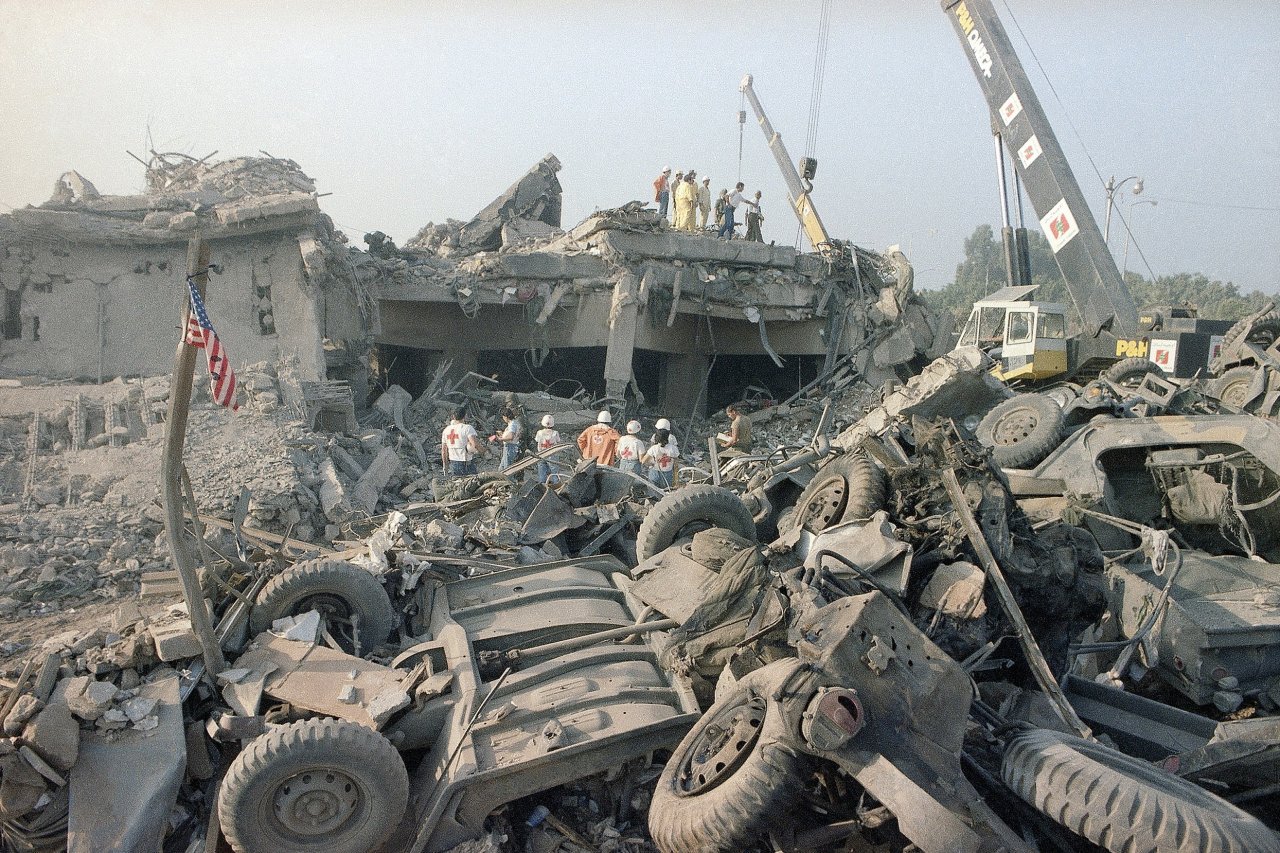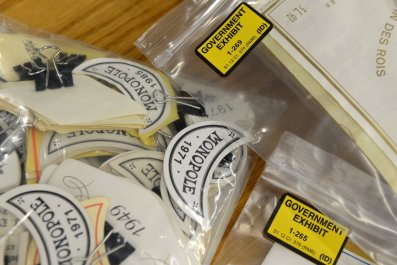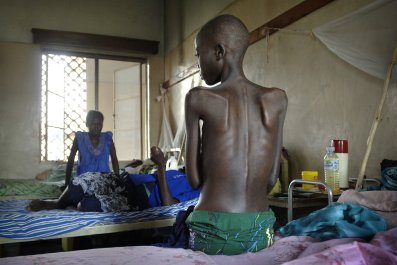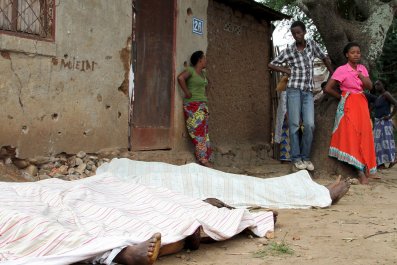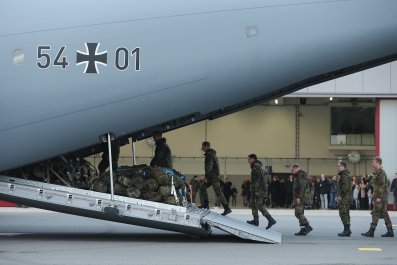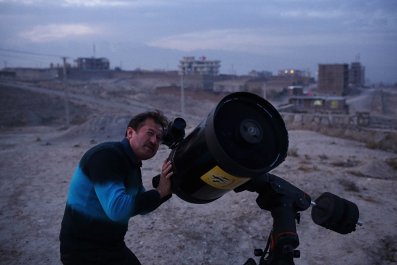In 2003, an American private investigator slipped into Beirut to take a videotaped deposition from a Shiite militant for a sensitive civil case in U.S. federal court. The militant, identified only by his first name, Mohammed, acknowledged under oath that he had helped prepare the 10-ton truck bomb that blew up the U.S. Marine barracks in Beirut in 1983, killing 241 American peacekeepers. Mohammed also disclosed that several Iranian officials in Damascus, Syria, were in daily contact with the group building the truck bomb.
When the investigator returned to Washington, he testified in court behind a screen, speaking into a device that disguised his voice to protect trusted associates in Lebanon who had helped arrange the deposition. "We had some serious concern about people in Lebanon somehow being connected with [the deposition], and they would be gone"—killed—if rivals discovered their involvement, recalls the investigator, who spoke to Newsweek on strict condition of anonymity.
The PI's secret trip to Beirut shows the lengths to which a small band of pragmatic and resourceful lawyers have gone to win judgments against Iran and other rogue states on behalf of American victims of state-sponsored terrorism. Under a controversial 1996 law that allows civil suits in U.S. courts against states that sponsor terrorism against Americans, these attorneys have already won some $12 billion in compensatory judgments, mostly against Iran. Their clients, numbering around 2,500, include the survivors and families of those killed in some of the worst overseas attacks in the past four decades. In addition to the Beirut Marine barracks bombing, the assaults include the 1983 bombing of the U.S. Embassy in Beirut, the 1996 bombing of Khobar Towers in Saudi Arabia and the 1998 bombing of the U.S. embassies in Nairobi, Kenya, and Dar es Salaam, Tanzania. The lawyers also have been looking out for the victims of the Tehran, Iran, hostage crisis that began in 1979.
So far, however, the judgments have been victories only on paper. To date, only a handful of victims have received any money, largely because it is difficult to seize the assets Iran and other terrorist-sponsoring states have stashed around the world, and Iran will never recognize the judgments. Those difficulties have been compounded by the Justice Department's reluctance to agree to the victims' demands to be paid compensation from the billions of dollars in penalties paid by businesses and banks for violating sanctions against Iran.
But all that is about to change. Provisions tucked into a huge spending bill President Barack Obama signed in December promise to provide at least some compensation to all of the victims who've won judgments, some of whom have been waiting for restitution for more than 30 years.
The provisions are the result of more than three years of negotiations between the victims' lawyers and key members of Congress. They establish for the first time a victims' fund of $1 billion, which will be drawn from penalties paid by the Paris-based bank BNP Paribas for violating sanctions against Iran, Sudan and Cuba. There's a possibility that another $1.9 billion in seized Iranian assets could become available to some victims from a case the Supreme Court will hear in January. The Congressional Budget Office projects an additional $1.5 billion will go into the fund over the next decade from criminal and civil fines from pending cases regarding Iran sanctions violations.
"This fund isn't going to be able to pay out everybody's full judgment, but the money that they get at first will be like a down payment," says Caragh Glenn Fay, daughter and colleague of Thomas Fortune Fay, a top Washington litigator working on behalf of the victims. For example, the Tehran hostages can expect an initial payout of at least $250,000, says Steve Perles, another lawyer for victims.
"I was so grateful that Congress remembered the sacrifice," says Alex Haas, who was 8 when his father, CIA Station Chief Kenneth Haas, was killed in the 1983 Beirut embassy bombing. "Terrorism has impacted my whole life," he says, his voice cracking with emotion. "A lot of us felt forgotten—forgotten by the government, forgotten by society. So the law feels like a recognition that there were people like my dad who gave their lives for the country."
Holocaust Compensation
The story of how the U.S. victims of state-sponsored terrorism can finally expect some compensation begins with a Jewish Holocaust survivor. Hugo Princz was the son of a naturalized American businessman living in what is today Slovakia, making him a U.S. citizen at birth. In 1942, townspeople turned over the Princz family to the Nazis, who ignored their U.S. passports and sent them to concentration camps in Poland. Princz's parents and sisters died in Treblinka, while Hugo, then a teenager, worked as a slave laborer for three years, first at Auschwitz, then at a factory in Dachau, outside Munich. U.S. forces freed Princz in May 1945 and treated him at an American military hospital.
Princz settled in the U.S. and applied for the monthly reparations payments Germany began giving to German Holocaust survivors and refugees in the 1950s. But because he was neither a German citizen nor a refugee, German officials turned down his repeated appeals. In 1992, he hired Perles to sue Germany in U.S. federal court, arguing that Congress never intended that a law prohibiting Americans from suing foreign governments—the Foreign Sovereign Immunity Act—should apply to the Nazis. Princz won in the lower court, but the decision was overturned on appeal, and the Supreme Court upheld the appellate court ruling in 1994. By then, however, Princz's case had drawn national attention, and in 1995 President Bill Clinton pressured German Chancellor Helmut Kohl into paying Princz and more than 40 other American victims of the Nazis some $25 million in reparations.
The case stirred strong feelings in Congress, where many lawmakers felt a lingering resentment toward the State and Justice departments for their defense of Germany's sovereign immunity. But what tipped the legal scales in favor of terrorism victims was the case of Aliza Flatow, a 19-year-old American exchange student killed in a 1995 Gaza bus bombing by an Iranian-backed militant group. Together with the murdered girl's father, Perles lobbied lawmakers for a law that would allow U.S. victims of state-sponsored terrorism to sue in U.S. courts.

In 1996, Congress passed a measure that did exactly that. "At some point, a foreign sovereign's conduct becomes so noxious toward a U.S. citizen that the foreign sovereign no longer can expect to receive sovereign immunity," Perles says, explaining the legal philosophy underpinning the law. "And if you want to tell bad guys that they ought not to be doing this, you've got to take their money away from them."
Over the next few years, Perles filed civil suits against Tehran on behalf of Flatow's father, the relatives of two Americans killed in Jerusalem by Iran-supported bombings and the family of a former Beirut hostage held by Shiite extremists during the 1980s. At the time, both State Department officials and legal experts dismissed Perles's chances. But in a series of judgments between 1996 and 2002, he not only won a $77 million award for his clients but also found the funds to pay for it in an account containing $400 million that prerevolutionary Iran maintained at the Pentagon to pay for U.S. weapons, which was seized when the U.S. hostages were taken in 1979.
Perles's courtroom success prompted other victims to come forward. In 2002, he teamed up with Thomas Fortune Fay to represent the survivors and families of those killed in the Beirut Marine barracks bombing in several suits against Iran (including the one in which the PI testified after his clandestine trip to Beirut). In a series of judgments between 2007 and 2012, the court awarded the victims a total of $4.2 billion. Acting on a tip from the Bush administration, which wanted to cripple Iran's nuclear program, Perles located $1.9 billion in laundered Iranian funds in a New York Citibank account and seized it to pay the victims. Those funds are now at the center of an Iranian challenge before the Supreme Court.
Meanwhile, Stuart Newberger, a prominent international lawyer, won a $335 million judgment in 2003 for the victims of the Beirut embassy bombing. That same year, Perles, Fay and Newberger, each representing different groups of victims of the 1998 East Africa embassy bombings, filed suit against Iran and Sudan for their complicity in the Al-Qaeda bombings that killed more than 220 people. By 2014, they had won judgments totaling $8 billion.
Show Them the Money
Again and again, despite judgments in their favor, the victims have been frustrated by the difficulty in finding the funds to pay for them. Newberger traveled to Italy in 2008, where he had traced some $500 million in Iranian funds to an Italian bank. But an appellate court in Rome rejected his request to seize the funds. Even more discouraging was an opinion in an unrelated case by the International Court of Justice in the Hague, which said the judgments in U.S. courts against foreign countries violated the principle of sovereign immunity and therefore were illegal under international law. According to Perles, Newberger concluded that the victims stood a better chance of being paid their compensation awards if he could convince Congress to pass legislation creating a victims' fund, rather than spending his time going after Iranian money in foreign banks.
Newberger found a receptive audience on Capitol Hill, where some lawmakers have been pushing for terrorist victims compensation for years. More to the point, he also found that key members of the House and Senate judiciary committees were open to crafting a legislative remedy. For good measure, Newberger brought along Alex Haas, the son of the slain Beirut CIA station chief, to meet with lawmakers and add a victim's voice to the lawyers' efforts.
Still, in a climate of tight budgetary restraint, it took Newberger, aided by Perles and Gary Klein, another Washington attorney, more than three years to design the victims' fund, write the legislation and get Congress to act on it. Obama signed the measure on December 18.
Under the measure, the Tehran hostages, the survivors or their estates, theoretically stand to receive $4.4 million each, based on a formula that awards each $10,000 per day for the 444 days spent in captivity. But with far more claims than the fund can satisfy in its first year, the law stipulates that the first $1 billion will be divided equally among all the victims. The first payments must be made by December 2016. Only after all the victims have received at least 30 percent of their judgments are they eligible for further prorated payments as more funds become available.
"The way this was set up, all boats rise with the tide," says a congressional aide. "Nobody gets favored, and nobody gets left behind."
That goes for the lawyers too. The law caps attorneys' fees at 25 percent of any reward—far less than their usual contingency fee of 33 to 40 percent. But that still means attorneys like Perles, Fay, Newberger and their teams will be divvying up a cool $250 million. By any measure, that's doing well by doing good.
Additional reporting by Jeff Stein



